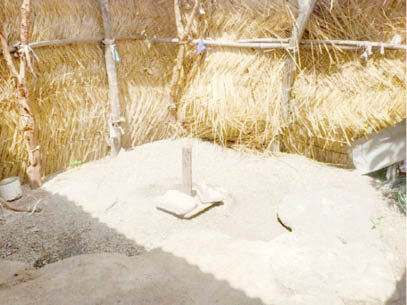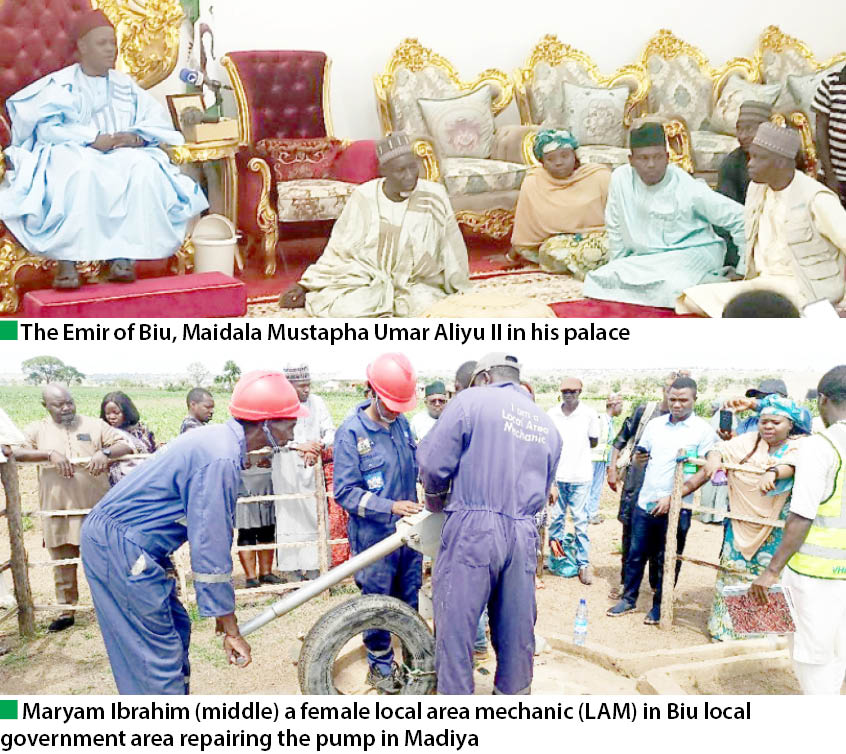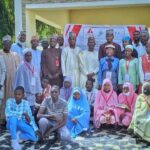Nigeria has the highest open defecation rate in the world. And only 102 out of the country’s 774 local government areas are certified open defecation free. Residents of Biu and Shani—the first two local governments areas of Borno State to be declared open defecation free (ODF), recount strategies deployed to achieve the status as well as the benefits.
As the vehicle snaked its way from Biu town through the hilly roads to Madiya, a village within Biu local government area of Borno State, no one was observed defecating in the open. There was also no excrement in sight or foul smell in the air as the vehicle drove through the communities, and throughout the time spent in Madiya.
Biu and Shani local government areas of Borno State were recently declared open defection free by the National Task Group on Sanitation.
Open defecation is the practice of defecating or disposing human faeces outside, such as in the fields, street, gutters, bushes, forests, open bodies of water and other open spaces rather than in the toilet.
Twenty-four states and the Federal Capital Territory (FCT) of Nigeria do not have any open defecation free validated local government area.
According to the United Nations Children’s Fund (UNICEF), open defecation has devastating consequences for public health. It said faecal matter contaminates food, water and the environment, and can spread serious diseases, such as cholera.
UNICEF said coupled with poor hygiene practices, exposure to faecal matter remains a leading cause of child mortality, morbidity, undernutrition and stunting, and can negatively impact a child’s cognitive development.

It also causes hospital-acquired infections, and neglected tropical diseases, with more than 60,000 deaths occurring each year in Nigeria due to poor Water, Sanitation and Hygiene (WASH) practices. Other cost of open defecation are economic losses, loss of dignity, and environmental contamination and degradation, among others.
Adama Musa, a housewife and resident of Madiya, said there was no toilet in their house when her husband built it. But they have now built a toilet as a result of the sensitization they got from the UNICEF WASH programme. She said they now defecate in the toilet and no longer in the open.
She added that the water from the borehole donated by UNICEF to the community also enables her maintain and keep the toilet clean.
Bulama (village head) of Madiya, Julde Adamu, said when the UNICEF team approached him about ending open defecation, he saw it as a good idea aimed at protecting the health of his people.
He said, “I was interested, and decided to mobilise my residents, young and old alike, to assemble and listen to the team. The people welcomed the idea to the extent that we have been able to mobilise all the over 300 households in the community to have toilets in their houses.”
He said he also complained to UNICEF about the lack of water in his community.
“There was no water in the community, no stream or well and the residents had to go very far to fetch water. So, UNICEF donated a borehole to the community. This has helped stop my people from excreting or even urinating in the open. The health of my people has improved, there is reduction in diseases, and the environment has also become cleaner,” he said.
The Bulama explained that the intervention of the Emir of Biu also helped address the reluctance of those who were initially uncooperative in stopping open defecation in the community.
Adamu made the disclosure during a media dialogue and field visit on open defecation to Biu, and Shani local governments areas, organised by the UNICEF in collaboration with the Child Rights Information Bureau (CRIB) of the Federal Ministry of Information and Culture.
Mohammed Isa, head of youths in Madiya, and a member of the WASH committee (WASHCOM) in the village, said he helped build the toilets in the community.
He said residents also contributed money among themselves to build the toilets. “To build a toilet cost about N100,000 as the challenge is usually in the digging. So, we volunteer to help.”
He added that the community is also free of open defecation, because they have also instituted a law against it, and that those who violate it are arrested and fined. “So far, the adults comply. It is only little children who urinate once in a while,” he said.
Garba Julde, Secretary of WASHCOM in the community, said he helped mobilise funds to help each household build a toilet, and that there is significant improvement in the health of children.
Senior local government area, WASH facilitator, Biu, Asabe Mshelbara, said the local government was so committed to improving sanitation and hygiene practices that the teams went to very hard to reach areas where returning back to Biu after sensitization programme sometimes was difficult particularly during the rainy seasons.
The transitional chairman, Biu local government, Sule Ali Abubakar, said the WASH Unit staff members are engaging with community members and going from one community to the other to educate people on the importance of a clean environment, good hygiene, sustaining the open defection free status and ensuring that cholera remains a thing of the past in Biu.
He said the local government has constructed toilet facilities in most of its institutions and also asked filling stations and schools to provide toilet facilities within their premises.
Represented by Saidu Kabura, Chief personnel Officer, he said evidence of partners support for WASH activities in the local government area include construction of WASH facilities in health centres, construction of toilets in public places, schools, markets etc, drilling, upgrading and renovation of boreholes across Biu local government area in different communities, and development of water safety plans, among others.
He said the local government area is grateful to UNICEF and donor organisations including the Governments of Netherlands and United Kingdom.
The Emir of Biu, Maidala Mustapha Umar Aliyu 11, during the visit by the team of journalists to his palace, said he is committed to ensuring that areas under his jurisdiction are open defecation free.
UNICEF WASH specialist, Lonis Salihu said the organisation was committed to providing technical assistance to sustain the open defection free status of the area certified under the Emir’s jurisdiction and also help more local government areas under him to become open defection free.
Experiences of residents of Shani local government area
The household of Emmanuel Some, a resident of Walama community, boasts of a very clean toilet.
He told the visiting team that sensitization on open defecation has helped him and other residents to stop open defecation.
He said, “those who have the wherewithal constructed ‘soak way toilets’, and those who do not constructed pit toilets. Before now, we use to share the stream with animals, but now the sensitization and construction of the bore hole by UNICEF and DIZ bank of Germany has helped improve sanitation and hygiene habits of the people of the community.”
The Hakimi (district head) of Walama ward, Ali Mohammed Walama, said the community has taken ownership of maintaining and repairing the solar powered borehole and other water facilities, to ensure optimal water and sanitation practices.
“We have given stern warnings that no one should defecate in the open. We have also enacted a Bye law which attracts a fine when violated with the support of the Emir of Shani.”
Yunana Some, deputy facility manager, Wulama Primary Health Care Centre (PHC), said there is a reduction in diseases like diarrhea in the community and environs because of the provision of a solar powered borehole by UNICEF.
“It has helped our health facility to have clean water to attend to patients and also clean the toilets, and the environment. Before now, we used to buy water from the town and it was not enough. We used to also see frequent cases of typhoid fever,” he added.
The General Manager, Borno State Rural Water Supply and Sanitation Agency (RUWASSA), Engineer Babagana Sa’ad, said, Community Led Total Sanitation (CLTS) concept was used to ensure that practices of open defecation were eradicated throughout Biu, Magumeri and Shani local government areas.
He said Borno State government through RUWASSA will continue to work with UNICEF and other development partners to implement developmental activities across Borno State and to sustain the open defecation free status in all communities.
Phuong T. Nguyen, UNICEF Chief of Field Office, North-East Nigeria, enjoined the government and residents of Biu and Shani local government areas of Borno state to sustain their open defecation free status.
She said open defecation is a threat to child survival, particularly those who live in communities affected by conflict, adding that the designation of Biu and Shani as open defecation free is a gift to vulnerable children and families.
While noting that becoming open defecation-free is a journey, and not a destination, she added that there are key elements of this journey that must be maintained.
She said, “In Biu, Shani and elsewhere in Borno State, government must lead and invest more in water, sanitation and hygiene facilities. Communities must be accountable in the protection and maintenance of WASH facilities,” she added.
UNICEF Nigeria WASH Specialist, Lonis Salihu, said Borno State is currently developing a roadmap to become open defecation free.
He said due to UNICEF supported interventions, two out of the 27 local government areas in the state have been declared open defecation free.
He said successes in expanding WASH facilities were recorded as a result of UNICEF’s adoption of “no one is left behind” method, high level of political will and acceptance of the programme from the traditional rulers, introduction of Bye-law to facilitate the attainment and sustenance of open defecation free, and Public Private Partnership (PPP) initiative to support local government areas and the state with provision of latrines in the public places.
UNICEF Chief of WASH, Jane Bevan, said Nigeria has been top five open defecator in the world for the past 15 years, moving from 5th place in 2003, second place in 2015 and now first place in 2023 with the eradication of open defecation in India in 2019.
Bevan, who was represented by UNICEF Nigeria WASH Specialist, Chisom Adimorah, said Nigeria cannot continue business as usual or it will miss the 2025 and 2030 national and global open defecation free targets.
She said there is need to strengthen and scale up proven strategies to reach the country’s goals.
“Therefore, we need to achieve at least 224 open defecation free local government areas annually between now and 2025 or 84 local government areas per year until 2030,” she advised.

 Join Daily Trust WhatsApp Community For Quick Access To News and Happenings Around You.
Join Daily Trust WhatsApp Community For Quick Access To News and Happenings Around You.


